Hellenostephanos. Humanist Greek in Early Modern Europe
Learned Communities between Antiquity and Contemporary Culture
| dc.contributor.editor | Päll, Janika | |
| dc.contributor.editor | Volt, Ivo | |
| dc.date.accessioned | 2018-09-17 09:52:09 | |
| dc.date.accessioned | 2020-04-01T12:32:22Z | |
| dc.date.available | 2020-04-01T12:32:22Z | |
| dc.date.issued | 2018 | |
| dc.identifier | 1000367 | |
| dc.identifier | OCN: 1051780905 | en_US |
| dc.identifier.uri | http://library.oapen.org/handle/20.500.12657/29565 | |
| dc.description.abstract | The rebirth of Ancient Greek in Europe was promoted by Humanist education and ideas to such an extent that we can consider the Greek language as a formative element of Humanist culture. Next to Latin, the default common language, a Humanist has to know and use Greek, because he is not, cannot and will not be a barbarian: barbaros ou pelomai, as Julius Caesar Scaliger claimed in his verses in 1600. Wreaths (stephanoi) have been the symbols of the cult of Muses from ancient times. After the love for Greek Muses had been revived by Renaissance Humanist poets and scholars, it has remained with us both in poetic activity and in scholarship. The Hellenostephanos volume presents a collection of papers by scholars who study Humanist Greek, aspiring towards another revival of Hellenism, and trying to avoid being barbarians. The volume includes papers by Christian Gastgeber, Gita Bērziņa, Janika Päll, Charalampos Minaoglou, Erkki Sironen, Kaspar Kolk, Tua Korhonen, Johanna Akujärvi, Bartosz Awianowicz, Jean-Marie Flamand, Walther Ludwig, Alessandra Lukinovich, Martin Steinrück, Tomas Veteikis, Grigory Vorobyev, Vlado Rezar, Pieta van Beek, and Antoine Haaker. | |
| dc.language | English | |
| dc.language | German | |
| dc.language | French | |
| dc.relation.ispartofseries | Acta Societatis Morgensternianae | |
| dc.subject.classification | thema EDItEUR::2 Language qualifiers::2A Indo-European languages::2AH Hellenic languages | en_US |
| dc.subject.classification | thema EDItEUR::D Biography, Literature and Literary studies::DB Ancient, classical and medieval texts | en_US |
| dc.subject.classification | thema EDItEUR::D Biography, Literature and Literary studies::DS Literature: history and criticism::DSB Literary studies: general::DSBB Literary studies: ancient, classical and medieval | en_US |
| dc.subject.classification | thema EDItEUR::D Biography, Literature and Literary studies::DS Literature: history and criticism::DSB Literary studies: general | en_US |
| dc.subject.classification | thema EDItEUR::N History and Archaeology | en_US |
| dc.subject.classification | thema EDItEUR::3 Time period qualifiers::3M c 1500 onwards to present day | en_US |
| dc.subject.classification | thema EDItEUR::N History and Archaeology::NH History::NHT History: specific events and topics::NHTB Social and cultural history | en_US |
| dc.subject.other | Humanism | |
| dc.subject.other | Humanist education | |
| dc.subject.other | Humanist culture | |
| dc.subject.other | Humanist Greek | |
| dc.subject.other | Ancient Greek | |
| dc.subject.other | Hellenism | |
| dc.subject.other | Greeks | |
| dc.subject.other | Renaissance humanism | |
| dc.title | Hellenostephanos. Humanist Greek in Early Modern Europe | |
| dc.title.alternative | Learned Communities between Antiquity and Contemporary Culture | |
| dc.type | book | |
| oapen.relation.isPublishedBy | fed215d9-bf7f-466c-a9f3-5510b4847c64 | |
| oapen.relation.isbn | 9789949778232 | |
| oapen.series.number | 6–7 | |
| oapen.pages | 472 | |
| oapen.place.publication | Tartu | |
| oapen.remark.public | Relevant Wikipedia pages: Greeks - https://en.wikipedia.org/wiki/Greeks; Renaissance humanism - https://en.wikipedia.org/wiki/Renaissance_humanism | |
| oapen.remark.public | 21-7-2020 - No DOI registered in CrossRef for ISBN 9789949777587 | |
| oapen.identifier.ocn | 1051780905 |

